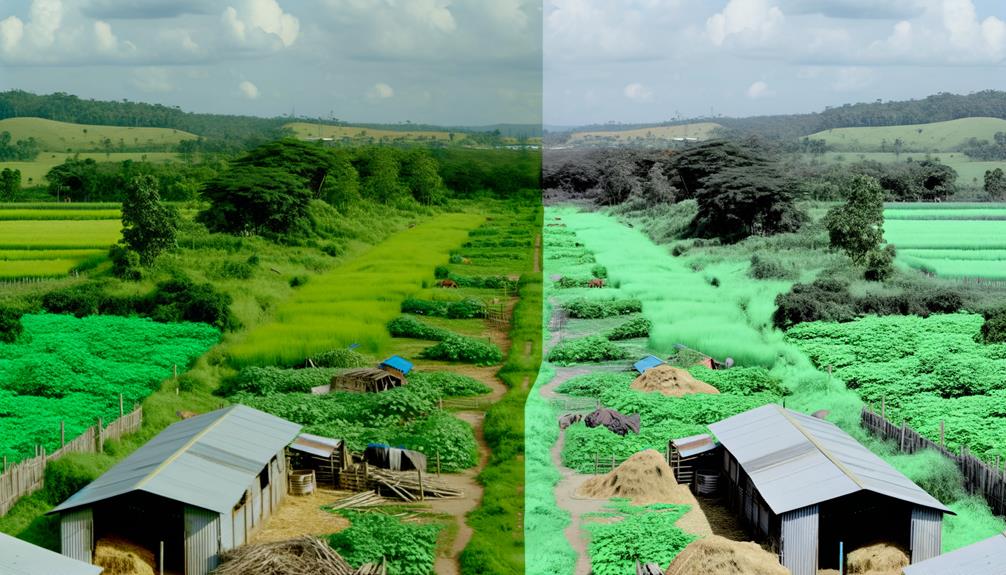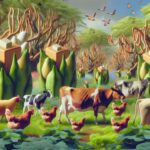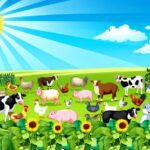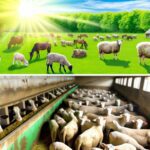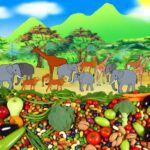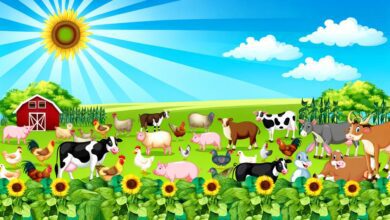As the first rays of dawn signal the beginning of a new day, so too does the rise of veganism herald a transformative period for animal industries. You’re witnessing a pivotal shift as consumer awareness and ethical considerations increasingly drive the market towards plant-based alternatives, echoing a profound respect for all forms of life. This compassionate choice resonates with a growing recognition of the intrinsic value of animals beyond their traditional roles in agriculture. You may find yourself questioning how deeply the roots of change will penetrate the fertile ground of established animal farming practices. Consider the dairy farms, once a cornerstone of rural economies, now facing the fresh breeze of plant milks sweeping through the marketplace. The impact of your dietary decisions is not a drop in the ocean but rather a wave that may just be gaining enough momentum to reshape the landscape. As you stand at the crossroads of tradition and innovation, you’re left to ponder: what will the animal industries look like when the dust settles?
Key Takeaways
- Shifting dietary preferences towards plant-based eating are leading to a decline in demand for animal products, particularly in the meat and poultry industries.
- The dairy industry is being disrupted by the growing popularity of plant-based milks and cheeses, driven by concerns for animal welfare and environmental sustainability.
- The leather industry is also experiencing shifts as more people adopt plant-based lifestyles and reject animal products, leading to a demand for innovative alternatives.
- The rise of veganism and plant-based alternatives is not only impacting animal industries but also stimulating the economy, revitalizing agricultural production, and fostering innovation.
Decline in Meat Demand
As you consider the shifting tides of dietary preferences, it’s clear that the surge in plant-based eating is beginning to nibble away at the traditional meat industry’s market share. You’re part of a compassionate movement that’s driving a significant shift toward plant-based diets. This isn’t just about personal health; it’s about fostering a world where the food choices you make reflect a deep care for all living beings and the environment.
The numbers speak volumes: with the meat industry currently observing a subtle yet unmistakable decline in meat demand, it’s evident that the call for plant-based food is resonating across the globe. You’re not alone in your journey; a growing community identifies with a vegan diet, expanding the ranks of those who opt for plant-based alternatives over animal agriculture industry products.
This shift to ‘green’ isn’t merely a trend; it’s a profound transformation of our collective palate, one that promises a kinder, more sustainable future. As meat consumption wanes, the ripple effects are felt across the livestock sector—farmers are now at a crossroads, contemplating a pivot to crops that support the burgeoning appetite for vegan options. Your choices are powerful, and they’re reshaping the industry from the ground up.
Dairy Industry Disruptions
Facing a wave of change, the dairy industry grapples with the growing popularity of plant-based milks and cheeses as more people choose vegan options. Your choice to embrace these alternatives is part of a significant shift in the food system, one that prioritizes animal welfare and seeks to address the ethical concerns associated with animal products. As you opt for plant-based alternatives, you’re contributing to dairy industry disruptions, challenging factory farms to reconsider their practices and land use.
You’re also part of a collective effort to combat climate change. The production of plant-based milks often requires less water and generates fewer greenhouse gases compared to traditional dairy farming. This is a compassionate step toward a more sustainable world where food market trends align with the protection of our planet.
Effects on Poultry Farms
The surge in plant-based diets has led to a notable decline in the demand for poultry products, pressuring the industry to adapt to changing consumer preferences. As you embrace a vegan diet, you’re not just making a personal health choice; you’re also impacting the agricultural system, particularly poultry farms. Animal farmers are seeing a shift in food production, with meat processing facilities experiencing less demand for animal-based meat.
This transition isn’t solely about moving away from meat; it’s about fostering food security through diverse, sustainable means. The environmental and health benefits of plant-based diets are encouraging more people to explore these options, leading to an increasing emphasis on animal welfare.
Here’s a concise look at the effects on poultry farms:
| Impact Area | Description |
|---|---|
| Economic | Poultry farmers and workers face challenges as the market for poultry shrinks. |
| Feed Supply | A decrease in poultry farming reduces demand for feed, affecting suppliers. |
| Animal Welfare | Growing consumer awareness is leading to higher standards in poultry living conditions. |
| Transition Support | Programs are emerging to assist farmers in shifting towards plant-based agriculture. |
You’re part of a compassionate movement that respects life and promotes a kinder food system. By choosing plant-based options, you’re not only nurturing your health but also contributing to a brighter future for our planet.
Shifts in Leather Production
Growing awareness and adoption of plant-based lifestyles are prompting a significant transformation in the leather industry, as consumers increasingly opt for cruelty-free alternatives. Your choice to embrace a vegan diet isn’t just changing what’s on your plate; it’s also reshaping the animal industry. As you commit to moving to a vegan or plant-based lifestyle, you’re part of a powerful wave that’s influencing leather production.
The rise in plant-based eating, fueled by a deep concern for animal welfare, health, and the environment, is creating ripples across the agri-food sector. Traditional forms of animal production, including the global meat industry and byproducts like leather, are feeling the impact. As more people reject red meat and other animal products, the demand for leather goods is also undergoing a shift.
You’re now seeing a marketplace that’s increasingly aligning with your values. Leather production, once a stalwart of the animal industry, is now innovating with plant-based materials. Your compassionate choices are not just a personal statement; they’re part of a collective movement towards a kinder, more sustainable world. Every plant-based purchase you make is a step towards a future where respect for all forms of life is woven into the fabric of society.
Alternatives Boosting Economy
As you explore the burgeoning world of plant-based alternatives, you’re not only championing animal welfare but also stimulating a vibrant sector of the economy. Your choice to follow a vegan diet is a powerful force, reshaping the landscape of food production and consumption. The shift toward plant-based options is not merely a trend; it’s a transformative movement that’s revitalizing agricultural production and creating a wealth of employment opportunities.
The surging demand for alternatives boosting economy signals a pivotal moment for the US meat and processing industry. While the traditional animal industries grapple with change, the plant-based market’s growth offers a beacon of hope, fostering innovation and diversifying agricultural commodities. This expansion isn’t just about replacing one product with another; it’s about envisioning a future where compassion and sustainability are at the heart of our food systems.
For those whose livelihoods are intertwined with animal industries, this evolution can be daunting. But with the right support—federal funding, new policies, and community programs—the transition can be a journey toward a more equitable and robust economy. As you contribute to this wave of change, you’re not only serving yourself but also nurturing an environment where everyone can thrive.
Frequently Asked Questions
How Is Veganism Affecting the Meat Industry?
You’re witnessing consumer trends shifting markets as ethical debates and cultural perceptions evolve. Dietary changes push supply chains towards farming adaptations, altering investment patterns and business strategies to prioritize protein alternatives in response.
What Would Happen to the Animals if the World Went Vegan?
If the world went vegan, you’d witness a mosaic of sanctuary challenges and ethical dilemmas as caretaking roles shift, promoting adaptation strategies for livestock futures and ensuring biodiversity through genetic conservation and habitat repurposing.
What Impact Veganism Has on the Environment?
You’ll reduce your carbon footprint and greenhouse gas emissions by embracing veganism. It conserves water, land, and promotes biodiversity, while decreasing pollution, deforestation, and bolstering ocean health and soil fertility to combat climate change.
How Does Being Vegan Affect the Economy?
As a vegan, you’re part of economic shifts influencing job fluctuation and consumer demand. Market adaptation sees agricultural change, with investment trends favoring food innovation. Trade alterations and retail impact prompt a compassionate policy response.
